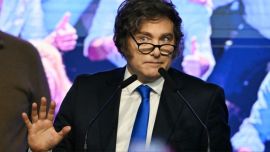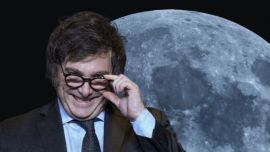One of Argentina’s top neuroscientists has been warning for a few months now about the mental health effects of both the global coronavirus pandemic and extended lockdowns and quarantines. Symptoms of depression have surged across different sectors of the population — younger people appear more to be more affected — while anxiety regarding the future, in part due to an increased sensation of fear, will have a protracted social and economic cost. The lack of social contact, confinement, and a current state of alert given protracted panic is causing anxiety and cognitively wearing down our population, making the future recovery even more uncertain. This is clearly evident among those with important responsibilities during these times of Covid-19, particularly political leaders, businessmen, journalists and others that have increased their workload dramatically. Lack of sleep, skipping meals, increased substance abuse and other troubling behaviour only exacerbates “burn-out” syndrome for these individuals.
There can be little doubt that President Alberto Fernández is feeling the physical and mental strain of leading Argentina as it traverses a series of interrelated shocks: coronavirus, economic meltdown, dysfunctional political system. Early optimism regarding Fernández’s capacity to close the “la grieta” or deep polarisation that characterises Argentina’s political system — and is, in great part, responsible for its chronic failures — has given way to a generalised sensation among the group of decision-makers known as the “círculo rojo” that he is being radicalised by his vice-president, Cristina Fernández de Kirchner. Furthermore, the lack of a credible economic plan has severely depressed the private sector’s expectations, even after Economy Minister Martín Guzmán successfully restructured the nation’s sovereign debt with private creditors. The desperate situation of Argentina’s largest urban sprawl, the conurbano (the cordon of municipalities that encircle Buenos Aires City ) is putting society on high alert, as Covid-19 cases continue to rise aggressively, as does insecurity and police brutality. The government’s response that “the state is present,” consistently repeated by Cabinet Chief Santiago Cafiero, begs the question of how much longer the Central Bank can run the printing presses before causing a violent eruption of devaluation and inflation, conditions to which Argentines are so long used to. Nothing says this louder than the black-market rate, with the blue chip peso index standing at a staggering 75 percent spread over the official peso-dollar rate.
The sensation that the end is nigh is a direct consequence of the gradual but consistent breakdown of political consensus between the ruling coalition and the opposition. As explained last week, inherent tensions among the ruling Frente de Todos and the opposing Juntos por el Cambio coalitions are testing the limits of Argentina’s major political factions. President Fernández built his presidential bid on the notion of being a pragmatic consensus builder, something which characterised his approach to the pandemic, building a triumvirate with City Mayor Horacio Rodríguez Larreta and Buenos Aires Province Governor Axel Kicillof. To a certain extent, Kicillof represented the more radicalised portion of the ruling coalition while Alberto absorbed the moderates. Rodríguez Larreta, a centrist within the group that responds to former president Mauricio Macri, had emerged as the de facto leader of the opposition. Internal hawks in each coalition pulled their leaders closer to the fringe elements, but moderates prevailed. And the triumvirate earned the highest approval ratings in the country, with President Fernández scoring high marks even among Macri’s voters.
All of this seems to have changed in a matter of weeks, not more than a month and a half. A series of decisions taken by the Fernández-Fernández administration has alienated the opposition, allowing the hawks in both coalitions to dominate the political arena. The botched expropriation of the Vicentin agricultural giant sparked fears of another confrontation with the only competitive sector in the Argentine economy (at least the only one capable of generating dollars through exports). A last-second emergency decree considering the telecommunications sector a public utility put the government on a direct collision course with the country’s most powerful media group, Grupo Clarín, and also sparked an angry rebuttal by the US Chamber of Commerce. A wealth tax in part pieced together by Máximo Kirchner, the leader of the Peronist caucus in the Chamber of Deputies, is in the works. Finally, the judicial reform that the president promised in his inauguration speech became politicised to the point where it came to be seen by the opposition – and a large portion of society – as a plan to inoculate Mrs. Fernández de Kirchner and her children from potential jail time.
Whether or not the judicial reform has any technical merit, and even if everyone agrees that Argentina’s Judiciary is completely crooked, it has allowed the opposition to take to the streets and raise their voice to, in their words, “protect the republic.” While Rodríguez Larreta worked diligently to build a working relationship with Alberto Fernández, Macri and his handpicked leader of his PRO party, former Security Minister Patricia Bullrich, egged on supporters. They call for freedom and respect of the institutions, and point to the political use of the Judiciary against them as evidence that Cristina is “going for everything.” They feed off of a long history of “anti-Peronism” that is growing to include more extreme sectors including far-right libertarians, some of whom even defend the brutal 1976-1983 military dictatorship. This week, a seemingly confused Eduardo Duhalde, a former ‘caretaker’ president, went on a media tour to suggest a military coup was being put together by “anti-communists.”
The political trick that has worked so well in the past is doing the job again, drawing and defining the battle lines ahead of next year’s midterm elections. Yet, in the present, it is potentially destroying a much-needed economic recovery. It was already difficult to envision how Argentina will generate a positive feedback loop that includes production, consumption and exports. Whatever Production Minister Matías Kulfas says, however many pesos Central Bank President Miguel Ángel Pesce prints, and whatever plan Guzmán can come up with, none of it will work if the biggest issue on the agenda is, once again, an ideological divide. There is a glimmer of hope, though, if the moderates win this one out.


















Comments